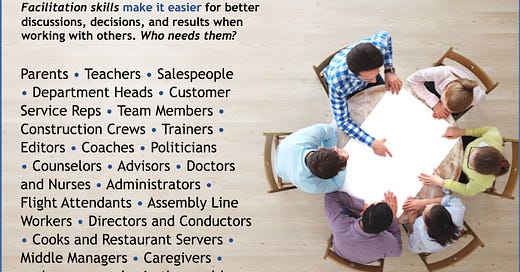Anyone Can—and Everyone Should—Make Facilitative Contributions (Facilitation Friday #2)
The success of a meeting or workshop should not rely solely on the facilitator or presenter.
Who is responsible for the success of a meeting, workshop, or conversation?
Too much responsibility often is assigned to the designated facilitator or presenter. In addition, facilitation frequently is considered the sole domain of the department head, the board or committee chair, or the consultant leading a planning process. This marginalizes the potential facilitative contributions participants can make, as well as their responsibility for (and ownership of) the outcomes.
Having a designated facilitator doesn't mean individuals can (or should) abdicate responsibility for the group to function well: “This meeting is really unproductive, but Dwayne is the facilitator, so I guess I can’t do anything about it.”
You don’t have to be the facilitator to be facilitative.
Anyone can—and everyone should—make facilitative contributions, regardless or role or responsibility.
Being facilitative when you’re not the facilitator
When a session has a designated facilitator, that individual’s primary responsibility is managing the process to produce better discussions, decisions, and results. But the facilitator is only one person with one perspective. Any participant may have ideas at any point for what might improve the group’s efforts.
How can they express those ideas—make facilitative contributions—when they are not the “person in charge”? This question may be particularly important if the person facilitating is their boss or someone with more positional power or authority than they possess.
Tap into core values, ground rules, or shared agreements
Leveraging existing group norms is an easy way to make a facilitative contribution peer-to-peer. Many organizations have statements of core values or principles; many groups create ground rules or shared agreements to guide discussions. Linking your suggestion to either helps neutralize any potential perception that you are usurping the facilitator’s role. “At the start of our strategy session, we agreed to focus on the big picture and stay out of the weeds. I feel like we’ve started to stray from that commitment.”
Use respectful, non-judgmental language
Parents trying to get their kids to do something know they can only sparingly use “because I said so.” Similarly, facilitators rarely use declarative or directive statements that force a group’s acquiescence.
Group participants looking to make facilitative contributions should do the same. To help participants do so when I am facilitating, I invite them to try on these facilitative phrasings:
I wonder if …
“I wonder if” is a more open and facilitative version of “We really need to.” The latter is a declaration and may spark disagreement; the former is open and may elicit others’ responses and reactions.
Example: “I wonder if we want to briefly review the committee’s report before we begin our discussions.” People often react by agreeing or disagreeing.
I would find it helpful if …
This statement of personal need often surfaces what others may find helpful. Example: “I would find it helpful to briefly review the committee’s report before we begin our discussions.”
Note that an unspoken ”I wonder if others would also” almost automatically follows the end of this personal expression. This may spark others to agree or share what they would find helpful. The group and/or the designated facilitator can then determine what to do next based on the mix of responses.
I’d love to hear from …
Good discussions are a prerequisite for good decisions. Ensuring a desirable mix of perspectives and participation is key. Inviting others to contribute is a facilitative gesture that can help draw out unheard voices or perspectives.
If you have privilege (in an organization overall or the specific meeting or workshop) be especially considerate to invite others’ contributions and/or amplify what they share.
These invitations can extend to certain types of contributions (“I’d love to hear from some folks we haven’t heard from yet on this topic”) or to specific individuals (“I’d love to hear from Helena and Carlos on this topic”).
Note that individuals singled out sometimes feel pressured to contribute. In extending the invitation, make it easier for them to decline without feeling awkward: “I’d love to hear from Helena and Carlos on this topic if they would like to share.”
Bottom Line?
Anyone can—and everyone should—make facilitative contributions. When you do so as a participant, you model for others how they also can contribute more to the success of a meeting or a workshop.
Getting in Action
As Roger Schwarz says in his book, The Skilled Facilitator, “Being a facilitative leader means changing how you think in order to change the consequences you help create.” Think about the groups and teams that you are a part of or the conversations and meetings in which you may participate:
What consequences do you want to help create?
What is required for that to occur? From whom?
What shifts in your thinking might help you contribute to the desired consequences?
Additional Application Ideas
Practice using some of the facilitative phrases in the situations or with the people you identified in your Learning Journal.
Discuss with colleagues how you all might be more facilitative in various meetings and gathering you have together.
© Facilitate Better and Jeffrey Cufaude. All rights reserved.
To affordably license this content for reprint on your site or in electronic or print communications or to contact me regarding customized facilitation skills workshops or consultations, complete this form.





